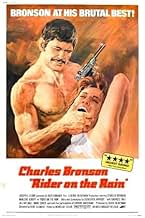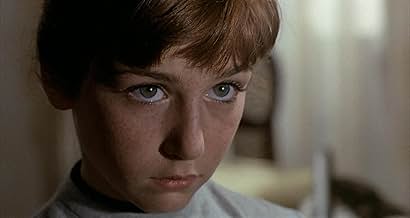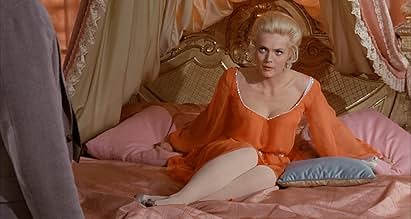AVALIAÇÃO DA IMDb
6,6/10
4 mil
SUA AVALIAÇÃO
Um coronel do Exército dos EUA na França tenta localizar um maníaco sexual que escapou.Um coronel do Exército dos EUA na França tenta localizar um maníaco sexual que escapou.Um coronel do Exército dos EUA na França tenta localizar um maníaco sexual que escapou.
- Prêmios
- 2 vitórias e 2 indicações no total
Yves Massard
- Armand's Henchman
- (as Yves Massart)
Enredo
Você sabia?
- CuriosidadesThe 1971 song by The Doors "Riders on the Storm" was reputedly influenced by this film. Jim Morrison allegedly was so taken in by the film and in particular its plot that he wrote the song as a result.
- Erros de gravaçãoIn the beginning of the film, the bus is seen passing by and then stopping with no one on board, yet when the bus drives off, the stranger with the red flight bag is seen at the bus stop.
- Citações
Col. Harry Dobbs: You expect me to eat that?
Mélancolie Mau: Americans live on ketchup and milk. I'm a whiz at geography.
- Versões alternativasThe film was shot twice, once with the cast speaking English and once with them speaking French, which the French version running just over two minutes longer despite having no additional scenes. The UK DVD released by Optimum includes both cuts of the film.
- ConexõesFeatured in Discovering Film: Charles Bronson (2015)
Avaliação em destaque
Considering its huge success in France and much of Europe at the time of its release, René Clément's Le Passager de la Pluie/Rider on the Rain (which also won the golden globe award for best foreign film) has been relatively forgotten. Yet, after 50 years, the film remains a highly original, captivating thriller, filled with peculiar imagery, symbolism and suspenseful mystery. Though it has some Hitchcockian influences and makes some homages to the great master of suspense, it is really a unique mystery, unlike anything made before or after it. From its moody opening sequence in the rain, to a chilling rape scene, the film develops into an idiosyncratic intrigue, that entices the viewer largely thanks to the interactions between its two magnetic main characters, played by Marlene Jobert and Charles Bronson, both on their way to become two of the most popular stars in France at the time. The two enjoy amazing chemistry, as Bronson tries by any means to get Jobert to admit that she has killed the man who raped her and Jobert does her best to outmaneuver him. Though this cat and mouse game goes on for most of the film, the viewer's attention is maintained through some interesting plot twists and imaginative dialogue that has some amusing recurring themes. The beautifully melancholic musical score by Francis Lai greatly contributes to the strangeness of it all. What makes the story particularly meaningful, however, is that the central plot is clearly an allegory for Jobert's character's subconscious and conscious struggle as a fragile, repressed and dominated young woman, who through traumatic events, manages to eventually confront her demons and assert herself. In this sense, despite the abusive treatment of her character (interestingly named Melancholy), the film is arguably well in tune with the rising feminism of the period. Marlene Jobert's superb performance is key to the film's success. She is very convincing and charming in her girlish portrayal of this modern Alice in Wonderland, effectively conveying innocence, confusion, fright, hysteria, sadness, and a range of other emotions. Meanwhile, Charles Bronson is excellent as her enigmatic pursuer and saviour, whose real motives are not clear until more than halfway through the film. Bronson, who had recently become an international star with Once Upon a Time in the West, plays his usual tough guy persona, but with more depth and intelligence than most of the roles that would follow. Ultimately, Le Passager de la Pluie works thanks to the performances of this duo, which is maybe why it is not more remembered. Unfortunately, Jobert became much less active in films from the 1980s, while Bronson became increasingly associated with a vengeful, violent persona, rather removed from the more interesting character he plays here. Incidentally, it is worth noting that the French version of the film is more satisfying that the English one, where every-one except Bronson is dubbed, mainly because the dialogue works better in its original language.
- PTaylor129
- 5 de jun. de 2020
- Link permanente
Principais escolhas
Faça login para avaliar e ver a lista de recomendações personalizadas
- How long is Rider on the Rain?Fornecido pela Alexa
Detalhes
- Data de lançamento
- Países de origem
- Idiomas
- Também conhecido como
- Rider on the Rain
- Locações de filme
- Empresas de produção
- Consulte mais créditos da empresa na IMDbPro
Bilheteria
- Faturamento bruto nos EUA e Canadá
- US$ 708.382
- Tempo de duração2 horas
- Mixagem de som
- Proporção
- 1.66 : 1
Contribua para esta página
Sugerir uma alteração ou adicionar conteúdo ausente

Principal brecha
By what name was O Passageiro da Chuva (1970) officially released in India in English?
Responda



























